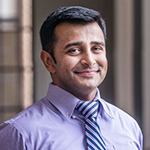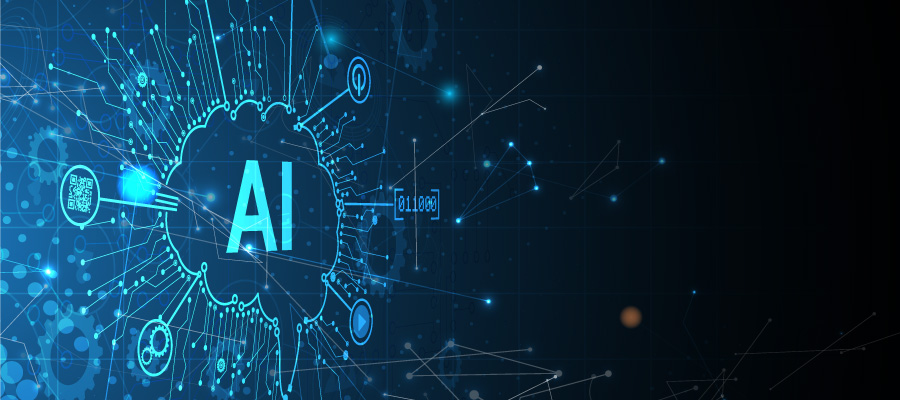Update: Watch the captioned recording of this session. You can also watch the recording with audio descriptions.
Join us on Friday, September 15, for lightning talks about biomedical applications of artificial intelligence from UW–Madison researchers working to develop algorithms and models to help us better understand the human body, improve communication and create treatments that improve and save lives.
This is the 12th installment in our webinar series about AI. You can learn more about the series, catch up on past seminars, and see what we have planned next on our “Exploring Artificial Intelligence @ UW–Madison” page.
Biomedical AI Research and Applications
- Date: Friday, Sep 15
- Time: 9:15am to 10am Central Time
- Location: Zoom
- Cost: Free
Add this event to your calendar
This virtual event will be auto-captioned. Please email us if you need additional accommodations to participate. We will share a professionally captioned video recording and any presented materials and resources on this page the week after the webinar.
About the speakers
Anthony Gitter
 Anthony Gitter, Ph.D., is an associate professor of Biostatistics and Medical Informatics and affiliate faculty of Computer Sciences as well as an investigator at the Morgridge Institute for Research in the Center for Research in Virology and Research Computing. He is an affiliate of the Data Science Institute and the Center for Genomic Science Innovation. His research group uses network modeling to connect genomic, transcriptomic, and proteomic data and provide a cohesive view of a biological process, with special emphasis on virology and oncology. In addition, they explore machine learning applications in biochemistry, such as computationally-guided high-throughput chemical screening and protein design.
Anthony Gitter, Ph.D., is an associate professor of Biostatistics and Medical Informatics and affiliate faculty of Computer Sciences as well as an investigator at the Morgridge Institute for Research in the Center for Research in Virology and Research Computing. He is an affiliate of the Data Science Institute and the Center for Genomic Science Innovation. His research group uses network modeling to connect genomic, transcriptomic, and proteomic data and provide a cohesive view of a biological process, with special emphasis on virology and oncology. In addition, they explore machine learning applications in biochemistry, such as computationally-guided high-throughput chemical screening and protein design.
Yin Li
 Yin Li, Ph.D., is an assistant professor in the Department of Biostatistics and Medical Informatics and an affiliate faculty in the Department of Computer Sciences. His primary research focus is computer vision and its application in healthcare, with a focus on creating novel algorithms for image and video analysis. His research program balances core methodological development and collaborative research. On the methods side, his group develops new techniques motivated by the tasks of video understanding and human activity analysis. On the application side, they seek to deliver novel, accurate, and objective measurements for biomedical applications, including their recent efforts on automated analysis of eye surgical videos for surgical skill assessment.
Yin Li, Ph.D., is an assistant professor in the Department of Biostatistics and Medical Informatics and an affiliate faculty in the Department of Computer Sciences. His primary research focus is computer vision and its application in healthcare, with a focus on creating novel algorithms for image and video analysis. His research program balances core methodological development and collaborative research. On the methods side, his group develops new techniques motivated by the tasks of video understanding and human activity analysis. On the application side, they seek to deliver novel, accurate, and objective measurements for biomedical applications, including their recent efforts on automated analysis of eye surgical videos for surgical skill assessment.
Junjie Hu | 胡俊杰
 Junjie Hu, Ph.D., is an assistant professor with appointments in the departments of Biostatistics and Computer Sciences and the UW Data Science Institute. His research focuses on natural language processing and machine learning, specifically multilingual natural language processing, transfer learning and multimodal learning, and their applications to support human-machine communications. His work aims to build robust intelligent systems that evolve with changes in the environment and interact with people speaking different languages.
Junjie Hu, Ph.D., is an assistant professor with appointments in the departments of Biostatistics and Computer Sciences and the UW Data Science Institute. His research focuses on natural language processing and machine learning, specifically multilingual natural language processing, transfer learning and multimodal learning, and their applications to support human-machine communications. His work aims to build robust intelligent systems that evolve with changes in the environment and interact with people speaking different languages.
Anoop Mayampurath
 Anoop Mayampurath, Ph.D., is an assistant professor in the Department of Biostatistics and Medical Informatics. He co-leads the ICU Data Science Lab, an integrated data science laboratory with a research focus on using electronic health record data combined with epidemiology, biostatistics and machine learning methods to improve care for hospitalized patients. His work seeks to develop and implement clinically useful algorithms and decision-support tools to assist in the delivery of early, personalized care to decrease preventable death. He is particularly interested in developing explainable models for predicting outcomes in hospitalized children.
Anoop Mayampurath, Ph.D., is an assistant professor in the Department of Biostatistics and Medical Informatics. He co-leads the ICU Data Science Lab, an integrated data science laboratory with a research focus on using electronic health record data combined with epidemiology, biostatistics and machine learning methods to improve care for hospitalized patients. His work seeks to develop and implement clinically useful algorithms and decision-support tools to assist in the delivery of early, personalized care to decrease preventable death. He is particularly interested in developing explainable models for predicting outcomes in hospitalized children.
Vikas Singh
 Vikas Singh, Ph.D., is a professor with appointments in the Biostatistics & Medical Informatics and Computer Sciences departments. His research aims to develop novel models and algorithms to solve real image- and data-analysis problems in scientific, biomedical, engineering and industrial applications. His research group focuses on developing algorithms whose mathematical properties can be analyzed by extending or adapting ideas from statistics, geometry or optimization, and then sharing open-source tools to benefit the scientific or industrial application that initiated the work.
Vikas Singh, Ph.D., is a professor with appointments in the Biostatistics & Medical Informatics and Computer Sciences departments. His research aims to develop novel models and algorithms to solve real image- and data-analysis problems in scientific, biomedical, engineering and industrial applications. His research group focuses on developing algorithms whose mathematical properties can be analyzed by extending or adapting ideas from statistics, geometry or optimization, and then sharing open-source tools to benefit the scientific or industrial application that initiated the work.
About the series
The “Exploring Artificial Intelligence @ UW–Madison” webinar series will run from June to September 2023, featuring webinars exploring a wide range of perspectives and topics relating to the rapidly advancing field of generative AI.
Sponsored by the university’s Division of Information Technology and Data Science Institute, the series aims to provide a platform for experts and visionaries in the field of AI to share their insights, research and experiences in the classroom, research lab and wider academic community.
By delving into topics such as AI ethics, cutting-edge machine learning algorithms, automation and human-machine collaboration, we hope to foster a deeper understanding of AI’s transformative potential and its implications for higher education.
